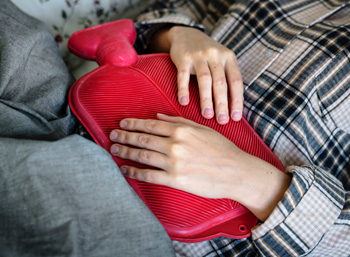Chronic pelvic pain : A debilitating and hidden problem
© Louise Player-Bishop for Auckland Therapy Blog, 25 Feb 2019
What is Chronic pelvic pain?
 'Annie' is age 34, and for years has suffered from debilitating,
ongoing pelvic pain and she comes to psychotherapy. Two questions emerge
from this:
'Annie' is age 34, and for years has suffered from debilitating,
ongoing pelvic pain and she comes to psychotherapy. Two questions emerge
from this:
- What is chronic pelvic pain
- How can psychotherapy help?
Chronic pelvic pain (CPP) is considered to be as common as lower back pain or asthma but isn’t as well known. In New Zealand, research suggests that around 24% of women have experienced CPP. Costs associated with CPP in New Zealand are unknown, but in Australia CPP costs are estimated to be around $6 billion annually. This is a huge cost for something that is mostly hidden and seldom discussed.
The alarm just keeps on ringing
CPP often starts with acute pain, where pain receptors are stimulated due to trauma or cellular disruption. The body then signals a need to decrease activity to protect the injured part of the body from further pain. This is similar to an alarm being activated. Chronic pain, however, reflects a sensitised or amplified acute pain that has been constant for at least 6 months and/or is recurrent. This is where you can’t turn the alarm off. The pelvic part of the CPP description describes the ‘lower abdomen area’. As CPP is most commonly diagnosed in women this is where there is most research.
Mind and body together
CPP is complex to diagnose. It can be viewed from multiple perspectives including gynaecological, gastroenterological, neurological, urological, muscular, skeletal and psychological. This reflects both the complexity of causes and complexity of treatments. To add to this complexity, there may be other influences including stress and psychosocial factors. Psychosocial factors are the factors or influences mixed up with one's thoughts, feelings and behaviour. Additionally, the pain could be a either a symptom of one diagnosis or multiple diagnoses, which further complicates treatment.
Unknown causes
In the mainstream health system there are many established and proven treatments based on the diagnosis. Having a diagnosis such as endometriosis, chronic pelvic inflammation, adhesions, Irritable Bowel Syndrome, dysmenorrhoea and so on, can be beneficial to the individual because a course of treatment can generally be provided. Knowing what ‘it is’ can feel validating and reassuring.
On the other hand, not knowing can be isolating and leaving one feeling hopeless, even seen as pretending with a pain invisible to others. In some research, laparoscopic findings showed ‘no pathology diagnosed leading to a ‘no diagnosis’. This outcome was considered more troubling and harder to deal with than a diagnosis.
Hidden suffering
An additional factor to the ‘diagnosis, no-diagnosis’ conundrum is the culture of keeping menstrual concerns and problems with ‘that area’ secret. Pelvic pain is seen as something only women get; a womanly affliction. This potentially both hides and normalises the pain or the burden, leading to a ‘get on with it’ attitude. In turn, this may lead to more suffering or not being diagnosed or treated.
Depression, anxiety & isolation
Research has shown a strong association between CPP and depression, mood swings, and anxiety. Outcomes can include greater social isolation and feelings of despair which impact on confidence and general enjoyment of life.
Some CPP sufferers report sleep problems, lethargy and fatigue; which all impact on daily life. Others have described their CPP as inflicting a significant social burden, with the pain negatively affecting education, careers, relationships, sexual enjoyment, their social lives and just day-to-day living. Terms such as ‘relentless and overwhelming’, ‘an emotional roller-coaster’, ‘powerlessness’ and ‘the body as a burden’ describe some of the feelings associated in living with CPP. Research has found that women who suffer from CPP measured significantly poorer in physical and mental health outcomes.
How does psychotherapy fit with CPP?
With chronic pain, research indicates that by learning to manage stress and negative thoughts, symptoms can be helped. This is not a let’s try something as ‘something is better than nothing’ approach but a well-researched measure to help those with chronic pain. Louis Corzolino, a renown American psychologist, states that therapy aims to “lessen suffering, reduce symptoms and increase a person’s ability to cope with stressors”. This, in essence, is where psychotherapy can help. By taking an overarching view, in understanding the unique factors influencing CPP, psychotherapy can help the individual manage this debilitating and hidden problem.
How I can help
As well as my general psychotherapy practice I have a particular interest in whole-person healthcare. This approach brings together all the different parts of your life, physical, emotional, mental and relational, to consider how they, either together or individually, may be impacting on your health and wellbeing. This is sometimes called the mind-body connection; simply put how your body impacts how you feel, and equally how your emotions impact your body. I have found this holistic approach effective for a range on chronic health conditions including chronic pain and CPP in particular.
